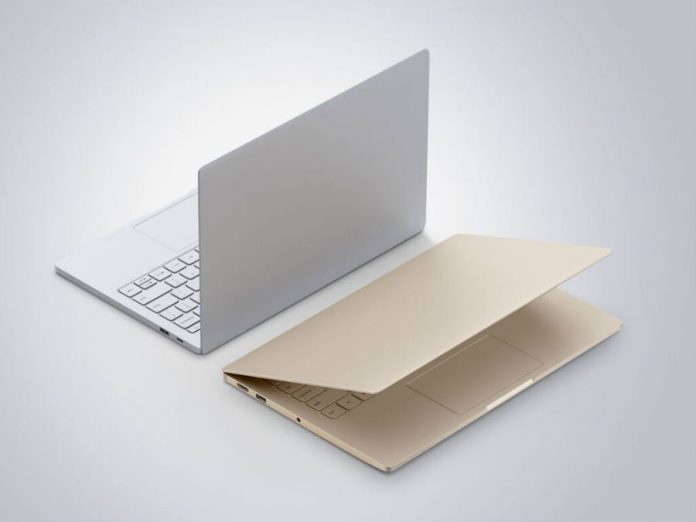
Chinese consumer electronics and computer hardware maker Xiaomi has finally launched the long-awaited Mi Notebook Air, its first-ever laptop, which had been in development since being unofficially revealed in December 2014. Visually similar to Apple’s Macbook Air line, the Mi Notebook Air from Xiaomi comes in two variants, the 13.3-inch model with a $750 price tag and the 12.5-inch at $525.
Xiaomi, the world’s 5th largest smartphone maker in 2015, is best known for making Android phones that offer the same or even improved specs in comparison to its more famous competitors like Samsung but cheaper.
The 13.3-inch Mi Note Book can run video games in full HD
The 13.3-inch full-HD Mi Notebook Air (14.8 mm, 2.82 pounds) is powered by Intel i5 processor, runs on Microsoft’s Windows 10 operating system, features 8GB DDR4 RAM and 256GB SSD storage, and includes a game dedicated NVIDIA GeForce 940MX graphics card for only $750.
https://www.youtube.com/watch?v=4pvIVutiT1Q
The more affordable 12.5-inch model (12.9 mm, 2.36 pounds), powered by Intel i3 processor, has 4GB RAM and 128GB SDD (expandable with the spare PCIe slot) and costs $525. An upside from this model is battery life, which can last 11.5 hours, two hours more than the 13.3-inch. Both models debuted at a press event in Beijing, China, alongside the Redmi Pro, Xiaomi’s first dual-camera smartphone.
The Mi Notebooks have a backlit keyboard, a Type-C USB for charging, two USB 3.0 ports, one HDMI port, a 3.5mm audio port, 1MP webcam, and a minimalistic metallic design, that comes in gold or silver. The 40Wh battery should last at least 9.5 hours, but with the mentioned USB-C charger it can reach 50% in just half an hour.
#MiNotebookAir has Intel® Core™ i5 Processor, 8GB DDR4 RAM + 256GB PCIe SSD, and expandable SSD slot pic.twitter.com/XV9tc5vbpx
— Xiaomi (@Xiaomi) July 27, 2016
They also come with an aluminum finish, instead of the leaked sandstone, and without any exterior logos, (only one Mi logo appears on the screen when opening the laptop). Not a spec but an interesting fact is that, although branded as Xiaomi, the Mi Notebook Air is made by a partner called Tian Mi.
It also comes with high performance dedicated graphics card with dual SSD expansion #MiNotebookAir pic.twitter.com/SiP74jE2UP
— Xiaomi (@Xiaomi) July 27, 2016
One spec that’s worth a highlight, due to being what other ultraportables don’t have, is the discrete graphics card NVIDIA GeForce 940MX that allows gamers to play titles like Dota 2 and World of Warcraft at 85 frames-per-second at full-HD resolution.
According to Xiaomi CEO Lei Jun, the Mi Notebook Air was designed for that, as rival laptops, like the Razer Blade Stealth, lack discrete graphics and rely on Intel’s integrated graphics, which substantially limit gaming capabilities.
The only similarities between Mi Notebook Air and the MacBook Air are the name and the look
Some critics have labeled the Mi Notebook as a copycat of the MacBook, but Xiaomi executive Hugo Barra described the accusations as a “melodrama.” But Jonathan Ive, Apple’s head of design, thinks otherwise. “It is theft, and it is lazy,” he said when photos of the Xiaomi laptop leaked into the net in late 2014.
There’s indeed a significant resemblance, both in design and name, to Apple’s Macbook Air, but they are very different. In fact, an early 2015 Macbook Air 13.3-inch model, although powered by Intel i5 processor as well, only has 4GB RAM, 120GB SSD storage (128GB without Mac OS), and an Intel HD Graphics 6000 card (meaning no gaming hardware) in contrast to its Chinese counterpart.
The Macbook also has a $999 starting price, while the most powerful Mi Notebook is $250 cheaper, with the 12.5-inch model being almost $500 cheaper and not that far behind on specs. Additionally, Xiaomi said its laptop is 13% thinner and 11% smaller thanks to a 5.56 mm bezel.
To Apple’s relief, the biggest problem for users wanting the Chinese laptop will be to put their hands on it. Xiaomi has only announced availability in China so far, with launch scheduled for August 2nd in the Asiatic country, and the Mi Notebook Air probably won’t make it to the United States.

However, Apple still has it’s well established and strong brand identity to their advantage as well as the top-notch Mac OS operating system. MacBook Air users don’t have to worry about anti-virus scanners and security patches, just to name a few of the issues that come with Windows operating systems, although Windows 10 has been able to solve many of them.
Plus, International Data Corporation (IDC), an American market research firm, expects the Chinese notebook market to contract by 10.4 percent in 2016. Xiaomi’s bet in the laptop business could prove risky. The company has also dipped into other markets, like rice cookers, drones, air purifiers and headphones, with analysts questioning its growth strategy, focus, and long-term profitability.
Source: TechCrunch










